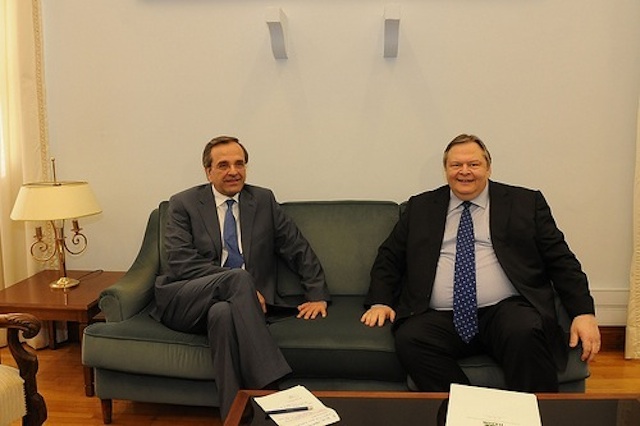 Samaras, Venizelos and Kouvelis finally managed to do what they avoided to carry out the week after May 6 elections. Was it worth going through a month in hell just to secure more MP power in the House? Did we really need to test the current ceiling of SYRIZA’s political power with the country hanging at the edge of the cliff? Or, perhaps, the insecurity of the three leaders proved beneficiary after all?
Samaras, Venizelos and Kouvelis finally managed to do what they avoided to carry out the week after May 6 elections. Was it worth going through a month in hell just to secure more MP power in the House? Did we really need to test the current ceiling of SYRIZA’s political power with the country hanging at the edge of the cliff? Or, perhaps, the insecurity of the three leaders proved beneficiary after all?
Let’s try out the accomplishments: first, in last Sunday’s run-off poll, Samaras, Venizelos & Kouvelis gained a satisfactory number of seats that will allow them to start talking about amending the constitution, second, spinning fear dilemmas on Greeks offered the new scheme a -previously non existent- grace period and third, they turned Alexis Tsipras’s SYRIZA into a major political power. These made things fall into place, since, despite its incoherent radicalism, Tsipras’ party is useful to Greek politics as useful wolves are to a flock of deer; they keep them alive and kicking.
Samaras and his associates, Venizelos and Kouvelis, have a good chance to prove that Tsipras’ angry and un-systemic approach is not really needed in Greek politics. Certainly, Greek citizens who did vote or were willing to support Alexis -for a variety of reasons- will remain angry and faithless towards a pro-MoU government that will have, eventually to collect a number of tax hikes and further suppress household wealth, or what’s left of it.
So, what should be done? Could Samaras avoid collecting revenues and stop the bleeding of Greek households? Probably not, since previous years’ phobias have left a series of bills unsettled; for instance real estate property taxes for the period 2009-2011 will start arriving en mass to households, plus last year’s tax bill that has already surged.
Despite the pre-election rhetoric, pressure on salaries and pensions will continue, perhaps not directly, but due to increases in utilities or through the new reduced tax-free threshold. What Samaras can do is to state emphatically that there will be no new taxes. This is the easy part. A tougher call would be to cancel pension cuts already announced and overdue, or order citizens to ignore Tax Bureau notes arriving by mail.
Policy directions agreed with our lenders cannot be avoided; troika people need results; they do not necessarily promote the ways to reach them. Therefore, the answer will not be found in the hype of “MoU renegotiation”; this will probably end up into merely prolonging the implementation of the country’s obligation timeline.
The real political challenge is to act radically and change things in three fronts: 1) quality of applied politics, 2) the citizens’ well-being and 3) creation of new GDP.
Referring to the quality of politics, Samaras government has an unexpected chance to act as the driving force for the restructuring of the Greek political system; the only -although the hardest- thing they have to do is to be innovative; escape political stiffness and rebrand Greek politics. The effort could excel if a twist is added through the adoption of some of Tsipras’ proposals, especially those that have to do with cutting down the salaries of ministers, ministry advisors and MPs.
Citizens’ well-being such as security, environment, health, implementation of the law and accountability of local government remain key policy areas that could offset cruel income cuts and household tax hikes. Improving public sentiment is possible through precise strategic planning and close monitoring of implementation. A great list of interventions could secure immediate and spectacular results with zero cost.
Finally, they need to create new GDP, not only through public works and privatisations, but also through the exploration of competitive advantages of Greece, such as agro-business, holistic tourism, transports, education and renewable energy sources. To manage that, you need to cut down red tape, integrate processes, embrace new ideas, advance innovative entrepreneurship and mobilise a huge amount of national product that remains unexploited.
Making these happen requires a new style in politics, out of the box thinking and new brainpower. Samaras and associates have to prove they are willing to foster all three of them.
That’s the smart thniikng we could all benefit from.